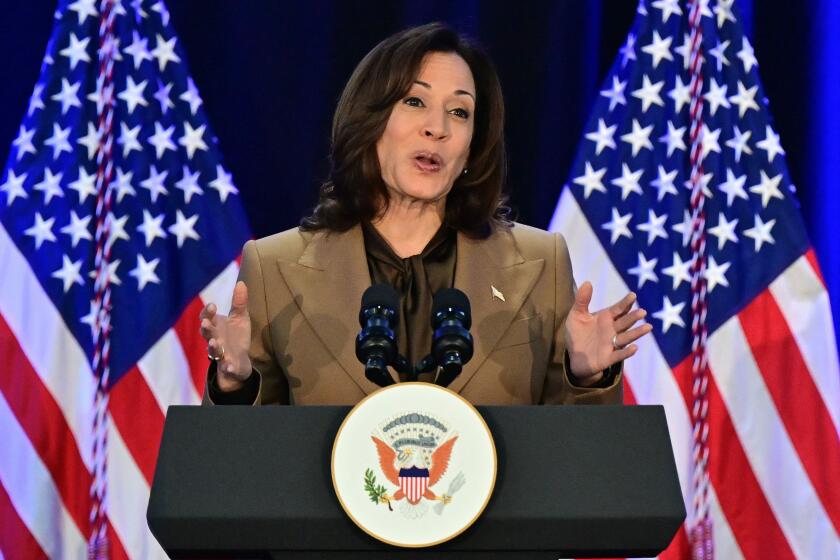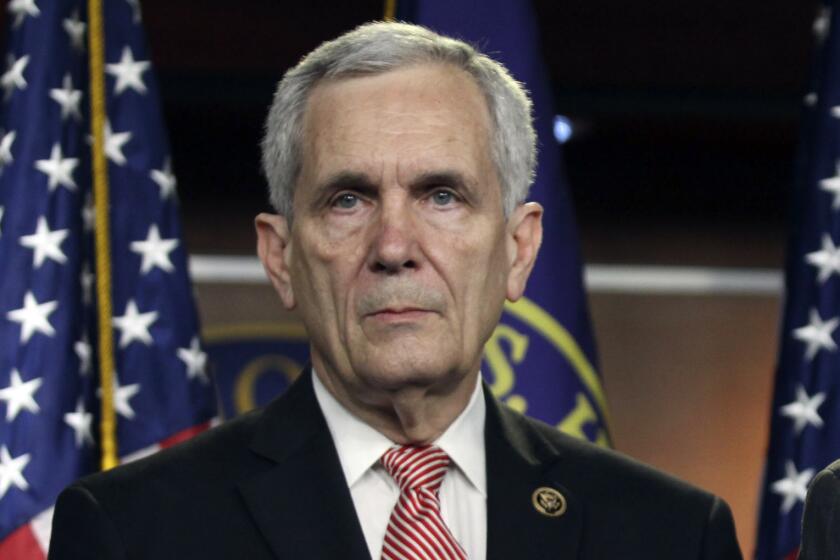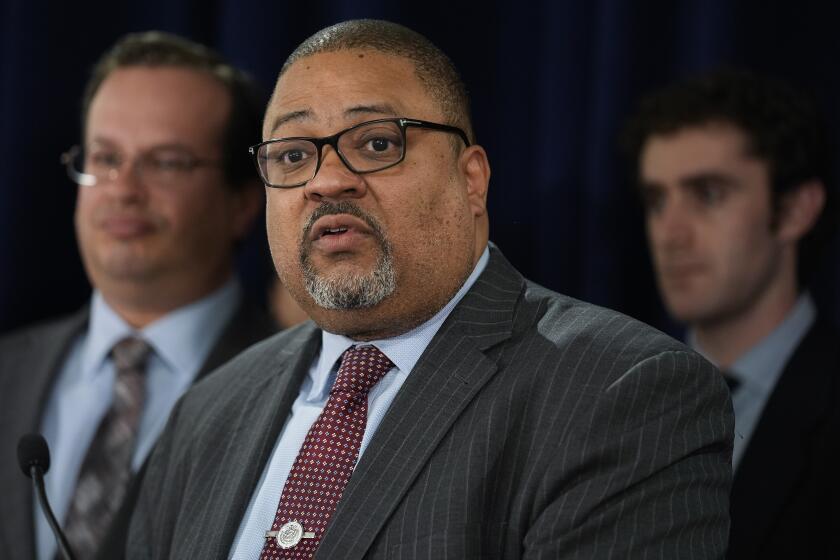S. Africans’ Votes Carry Hope for New Nation : Polling: About 30,000 emigres in the state will be able to cast absentee ballots in their homeland’s historic all-race election.
Ronald Kunene of Encino will make history April 26. So will his roommate, Sydney Skosana, their friend, Lebo Morake, and Lauretta Ngakane, who works in Burbank.
All four are black South Africans. Born in a country that excluded them, and forced into exile to pursue an education and their professions, they will vote for the first time 10 days from now in South Africa’s historic all-race election.
Matured beyond their years by the hardships they have endured, these young adults speak eloquently of the joy they feel--tempered with worry for their nation’s future--as they prepare to cast their absentee ballots along with 100,000 other South Africans living in the United States.
African National Congress leader Nelson Mandela, the symbol of the long struggle by blacks as well as many whites against apartheid, is virtually certain to become South Africa’s first black president.
“Of course, I am elated. A new nation is about to be born,” said Kunene, a 31-year-old UCLA graduate student. “It’s going to be a rough birth and even after the election, there will still be problems, probably for a long time.
“That’s nothing new,” he said. “In any birth there is a lot of pain. But out of the pain the beauty comes, the baby.”
But the specter of continued political violence in South Africa concerns Skosana, a 26-year-old studying computer science at Pierce College in Woodland Hills.
“Mr. Mandela is going to win the election, I am sure,” Skosana said, “but he may not be able to fulfill the promises he has made to the people.” Black opposition leaders “want their own land,” he noted. “We won’t know until after the election whether they will accept defeat. I wish they would unite and form one solid party.”
For Morake, 29, the election is a watershed. “Obviously, I’m extremely excited about it. It’s a new day in my country. I don’t know if there is anything else to say beyond that.”
Echoing that wonderment, Ngakane, who escaped from South Africa at age 10 with her family, added: “All these people are dying in South Africa and have died through history in South Africa. We all want to make sure the outcome of this election is positive.
“I wanted very much to go back home to vote. But unfortunately, my relatives who are still there are nothing but strangers to me now. It’s very sad.”
The South Africans living in the United States are eligible to vote if they are at least 18 years old and can prove South African citizenship. They can cast ballots at 14 polling places around the country, including the South African Consulate in Beverly Hills and at Irvine City Hall in Orange County. As many as 30,000 emigres could vote in California; groups of about 10,000 eligible voters each live in Los Angeles, San Diego and San Francisco. The polls will be open from 7 a.m. to 7 p.m.
On the same day, South Africans in 73 other countries will also help choose their nation’s leaders.
Their secret ballots will be hand-carried in sealed containers to Johannesburg by South African government officials, then counted with ballots cast inside South Africa on April 26 through April 28.
To ensure that black South Africans in Los Angeles capitalize on the historic opportunity, nearly 30 voter registration advocates gathered in a West Los Angeles church Saturday to devise a strategy for getting out the vote.
In the parish hall of St. Mary’s Anglican Church in Palms, members of the Coalition of South Africans in Los Angeles talked about the difficulties they have encountered while trying to register to vote at the South African Consulate.
Coalition members told of being required to produce birth certificates and other paperwork, long ago abandoned by South Africans exiles when they fled their homeland.
“Our documents are not up to date because we did not leave South Africa through the front door,” said Pauline Manaka, 43, who has been active in voter registration efforts for black South Africans in Los Angeles. “We had to leave our birth certificates and our families. There should be an opportunity, for us especially, to be excused if we do not have everything we need to vote.”
Voters will choose from more than 18 political parties on the ballot, not individuals. Although the ANC has a huge lead in the polls, as much as 17% of the electorate is believed to be undecided, The Times reported Friday.
Those undecided voters are not likely to derail Mandela’s expected landslide victory. But they could help determine how much power South African President Frederik W. de Klerk and blacks opposed to the ANC, including rival Inkatha Freedom Party supporters, will have in the new government.
Recent bloody clashes between ANC and Inkatha members in the Natal province have left an estimated 200 people dead. Still, Morake said the parties’ philosophical differences have been distorted in media accounts of the violence.
“Like any new country, there are bound to be minor conflicts, so to speak, between organizations with various opinions,” Morake said.
“But particularly in South Africa, most of the time the international media tends to exploit those minor differences and paint a picture like they are affecting the whole nation,” he said. “Some people unfortunately will lose their lives, but we are going through a revolution.”
Kunene and his roommate, Skosana, worry about the safety of their families who live in the small town of Springs, about 30 miles east of Johannesburg. Kunene, a Zulu, and Skosana, a member of the north African Ndebele ethnic group, were childhood friends. Both came to this country to get an education.
Kunene plans to return when he finishes his doctorate in history in about a year. He hopes to film documentaries, using experience he has gained from appearing as an actor and singer in American movies about South Africa, such as “Cry Freedom” and “The Power of One.” Kunene also toured with the national company of the Broadway hit musical “Sarafina!”
“I want to make documentaries about our history,” Kunene said. “Until now, they’ve all been from one (white) point of view.”
Morake added: “That was the old South Africa. The rotten South Africa.”
He remembers it well. Growing up in Soweto, the largest of South Africa’s black ghettos, Morake started singing on the street when he was 5.
“I’ve always had music in my heart,” explains Morake, now a professional singer and arranger.
At 14, he fled without telling his parents to the neighboring independent country of Lesotho and a year later to New York.
After several years in the United States, Morake returned to Johannesburg, where he lives with his second wife and 6-month-old daughter. Two older daughters from his first marriage live in South-Central Los Angeles with their mother.
Morake is in town working on the soundtrack for Walt Disney Pictures’ new movie, “The Lion King,” to be released in mid-June. He also appeared in “Cry Freedom” and “Sarafina!”.
Ngakane, the daughter of a Lutheran Church official active in the underground freedom struggle in Pretoria, spent her childhood in constant fear of the South African government’s security forces.
“The police were always coming to our house,” said the 25-year-old supervisor in the accounts payable department at All Post Inc., a Burbank post-production company.
When she was 14, her mother told Ngakane, her brother and two sisters to each pack a small bag of clothes for a weekend visit to the neighboring country of Botswana. They were never to return--small bags were used in order not to arouse the border guards’ suspicion.
Ngakane, who lives in Encino, wants to go back to South Africa for good some day. By then, she hopes--even if it is idealistic in the near term--all traces of the hated apartheid will have disappeared.
Although she likes Los Angeles, “I don’t feel very safe here. The class separation is very evident. I feel it every day. If I decide to take a walk at night in my neighborhood, the police will stop me and ask me ‘What are you doing here?’ I say I live here.
“But my next move will be to South Africa. I’m ready to go see what my own people are like and what my own country will become.”
At the parish hall in Palms, 68-year-old Gertrude Zikalala spoke of the country that Ngakane so badly wants to visit.
Zikalala recently left Soweto to visit her daughter, Thabi, in Los Angeles. They had not seen each other since Thabi left South Africa in 1976 during the Soweto student uprising.
Zikalala and her daughter will cast absentee ballots together.
“Apartheid has been too much,” said Zikalala, her eyes filling with tears as she shook her head and stared somewhere in the distance. “Too much, it’s pretty hard. But voting means a lot to me. I tend to vote at all costs because unless we get together, things will be shaky.”
For Sam Phillips, the election will mean the end of a voter registration project he started before leaving South Africa years ago.
“We have fought for this long and suffered long,” said Phillips, 46, head of art and culture for the Los Angeles chapter of the ANC. “I will be happy to vote here, but I will not be as fulfilled as if I was back home, being with my people and celebrating that day together.”
More to Read
Get the L.A. Times Politics newsletter
Deeply reported insights into legislation, politics and policy from Sacramento, Washington and beyond. In your inbox three times per week.
You may occasionally receive promotional content from the Los Angeles Times.






